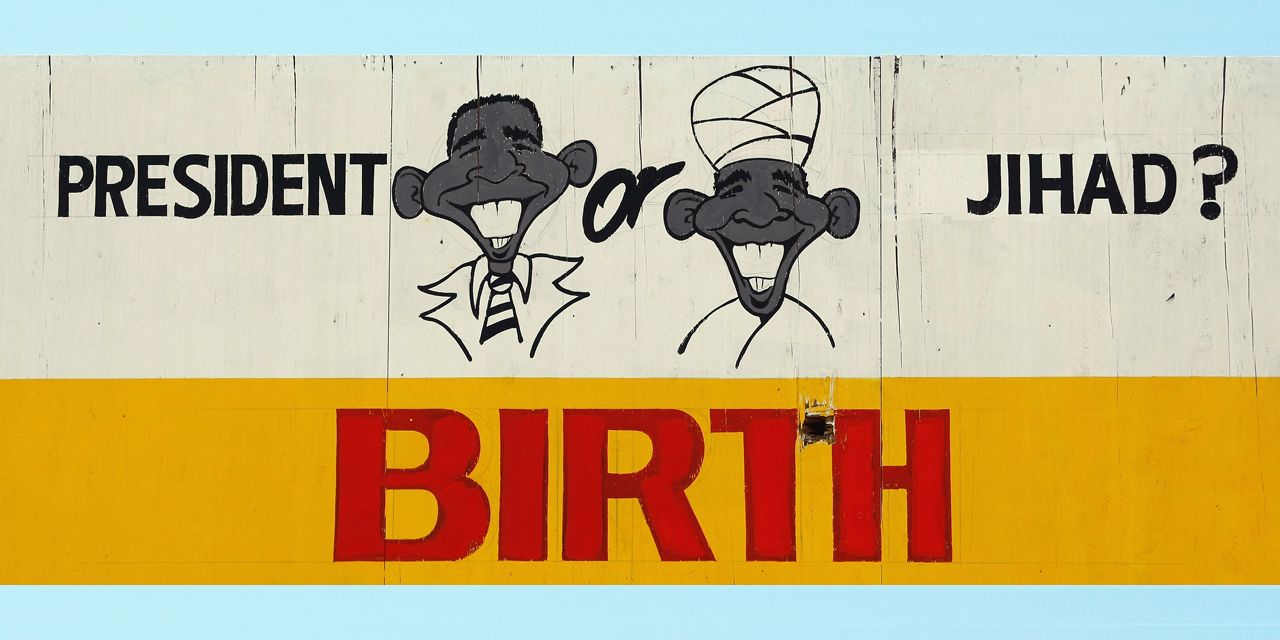
A detail of a billboard questioning President Barack Obama's American citizenship and lampooning him as an Islamic jihadist stands over a used car lot in November 2009 in Wheat Ridge, Colorado. (Photo by John Moore/Getty Images)
“Dog whistle politics” is more and more in the public conversation, as well it should be, because it’s the rocket fuel boosting Donald Trump into credible contention for the White House. Yet the term itself is poorly understood — or rather, all too easily allows the elision of a critical aspect of Trump’s campaign, and by extension electoral politics past, present and future.
Dog whistling is widely — and correctly — understood as expressing racially loaded ideas in coded terms. For instance, it uses “inner city” or “illegal alien” to stand in for communities of color, and “silent majority” to invoke white people. The birther nonsense — the repeated claim that the first African-American president might not be American-born after all — provides another good example. There’s nothing expressly racial about asking for a birth certificate, yet just beneath the surface roils the strong intimation of racial foreignness.
All too often, though — and here’s where the crucial error comes in — critics misconstrue dog whistling as a form of personal bigotry. Under this interpretation, terms like “welfare queen” and “thug” offer prejudiced individuals more acceptable ways for to say the n-word without actually saying it. This is how Hillary Clinton seemed to view it in her confrontation with Donald Trump as they sparred in the first presidential debate over his birtherism.
Clinton initially indicted Trump for peddling racist nonsense in an effort to pander to voters seized by racial fears. Trump, she stated plainly, “really started his political activity based on this racist lie that our first black president was not an American citizen. There was absolutely no evidence for it, but he persisted, he persisted year after year, because some of his supporters, people that he was trying to bring into his fold, apparently believed it or wanted to believe it.”
She immediately veered, however, and rather than focusing on dog whistling as strategy, she equated it with racial discrimination: “But, remember, Donald started his career back in 1973 being sued by the Justice Department for racial discrimination because he would not rent apartments in one of his developments to African-Americans, and he made sure that the people who worked for him understood that was the policy. He actually was sued twice by the Justice Department. So he has a long record of engaging in racist behavior.”
Partly the error is tactical. Linking dog whistling to personal prejudice reduces the issue to one of racial feelings. Accusations of dog whistling become a debate about someone’s soul, an issue of whether they are prejudiced or not — where no one can know what lies in the heart of another. Thus Trump’s retort: he assured the nation that he felt good about having opened a club in Palm Beach that did not racially discriminate. “And I’m very, very proud of it. And that’s the way I feel. That is the true way I feel,” he said — and who is to say otherwise?
More profoundly, equating dog whistling with personal bigotry minimizes the phenomenon. It’s not an expression of prejudice so much as a coldly calculated decision to seek advantage by manipulating the prejudice in others. Dog whistling is a strategy: it intentionally uses veiled terms to stimulate racial animosity, whipping up popular fears and stoking dangerous and misdirected resentments.
Dog whistling far more than the personal prejudices of one individual — even a president — threatens the nation. It’s socially destructive, intentionally firing the ugliest passions and pitting people against each other. It undermines democracy, manipulating voters through appeals to their worst instincts while distorting the real issues of the day. It’s an economic catastrophe, convincing working people to fear other vulnerable populations and instead to cast their lot with the plutocrats. It shatters the “we,” destroying our commitment to the community and public and instead fostering frightened isolation and anomie.
There are many reasons Donald Trump should not be president, but his racial discrimination 40 years ago is not among the most important. Far more damning is his strategic racism today.




